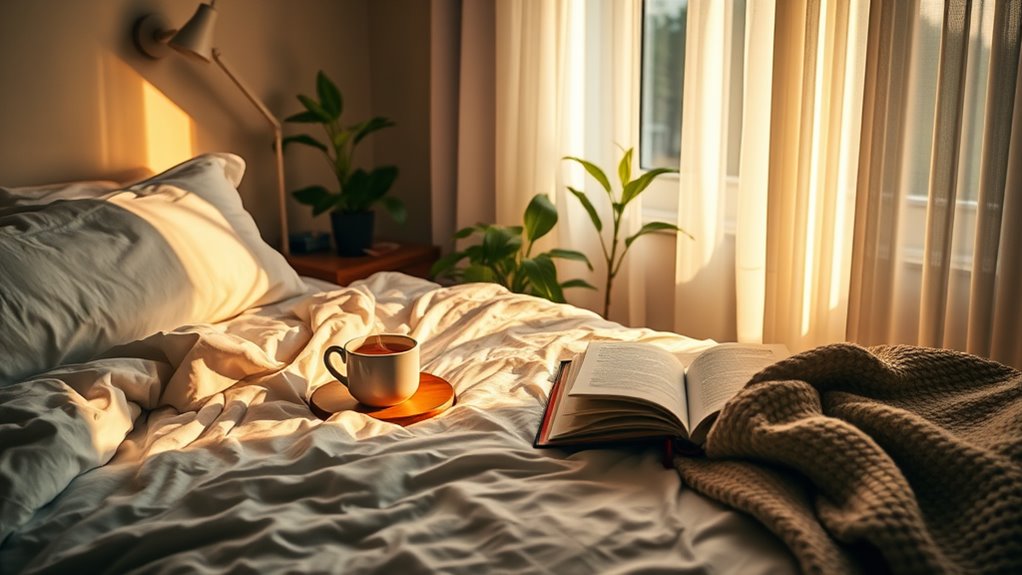Sleep Better Tonight With These Natural Tricks
If you’re struggling to get a good night’s sleep, you’re not alone. Many people find it hard to wind down and relax before bed. Fortunately, there are simple, natural tricks that can help you sleep better tonight. From creating a calming bedtime routine to optimizing your sleep environment, small changes can make a big difference. Ready to discover how you can transform your nights into restful ones? Let’s explore these strategies together.
Create a Calming Bedtime Routine
Establishing a calming bedtime routine can significantly enhance your sleep quality.
To sleep better naturally, start winding down an hour before bed. Dim the lights and engage in soothing activities, like reading or gentle stretching. Avoid screens, as blue light can disrupt your body’s natural rhythms.
Consider practicing mindfulness or deep breathing exercises to relax your mind. A warm bath can also help signal your body that it’s time to sleep. Incorporating aromatherapy techniques can further enhance your relaxation experience.
Consistency is key, so try to go to bed and wake up at the same time each day. This routine will set the stage for restful nights ahead.
Optimize Your Sleep Environment
To get the best sleep possible, you need to optimize your sleep environment.
Start by controlling the room temperature to keep it cool and comfortable, as this helps signal your body that it’s time to rest.
Additionally, minimizing light exposure can create a darker atmosphere that encourages deeper sleep. Incorporating essential oils into your bedtime routine can also enhance relaxation and promote a better night’s sleep.
Control Room Temperature
Creating the perfect sleep environment often starts with controlling your room temperature. Ideally, you want your bedroom to be between 60 and 67 degrees Fahrenheit. This cooler range helps lower your body temperature, signaling it’s time to sleep.
If you’re too hot or cold, it can disrupt your rest. Consider using a fan or air conditioner in warmer months, while cozy blankets or a space heater might be necessary in winter.
Don’t forget to invest in breathable bedding, too. A comfortable sleep environment encourages deeper, more restorative sleep, helping you wake up refreshed and ready for the day ahead.
Minimize Light Exposure
Dimming the lights in your bedroom can significantly enhance your sleep quality. Bright lights can interfere with your body’s production of melatonin, the hormone that regulates sleep.
To create a restful environment, consider using blackout curtains to block outside light and eliminate distractions. You might also want to turn off electronic devices or use a blue light filter in the evening.
Instead of harsh overhead lighting, opt for softer lamps or candles to set a calming mood.
Incorporate Herbal Remedies
Have you ever considered the power of herbal remedies for enhancing your sleep quality? Herbs like chamomile, valerian root, and passionflower can work wonders.
Chamomile tea is known for its calming effects, helping you unwind before bed. Valerian root may reduce the time it takes to fall asleep, while passionflower can boost overall sleep quality. Additionally, there are seven exceptional herbal teas that are recognized for their calming properties and can help improve sleep quality.
You can try these herbs as teas, capsules, or tinctures, depending on your preference. Just remember to consult with a healthcare provider before starting any new herbal regimen, especially if you’re taking other medications.
Incorporating these natural remedies could lead you to a more restful night’s sleep.
Limit Screen Time Before Bed
While herbal remedies can significantly enhance your sleep, there’s another important factor to consider: screen time.
The blue light emitted by smartphones, tablets, and computers can interfere with your body’s production of melatonin, the sleep hormone.
Try to limit your screen time at least an hour before bed. Instead of scrolling through social media or watching TV, opt for a calming activity like reading a book or journaling. This simple change can help signal to your brain that it’s time to wind down, making it easier for you to drift off into a restful night’s sleep. Additionally, incorporating relaxation techniques such as deep breathing or meditation can further improve your ability to fall asleep.
Practice Relaxation Techniques
Practicing relaxation techniques can be a game-changer for improving your sleep quality.
Simple methods like deep breathing, progressive muscle relaxation, or meditation can help calm your mind and prepare your body for rest.
Try taking a few minutes each evening to focus on your breath, inhaling deeply through your nose and exhaling slowly through your mouth.
Alternatively, consider guided imagery or gentle yoga stretches to release tension.
By incorporating these techniques into your nightly routine, you’ll create a peaceful atmosphere conducive to sleep, making it easier to drift off and enjoy restorative rest.
Additionally, incorporating meditation tips for beginners can enhance your ability to unwind and find tranquility before bed.
Give them a try, and experience the difference!
Maintain a Consistent Sleep Schedule
How can maintaining a consistent sleep schedule transform your nights? By going to bed and waking up at the same time every day, you’re training your body’s internal clock. This consistency helps regulate your sleep-wake cycle, making it easier to fall asleep and wake up refreshed.
Aim for seven to nine hours of sleep, and even on weekends, try to stick as close to your schedule as possible.
If you need to adjust your sleep time, do it gradually—by about 15 minutes each night. You’ll find that this simple practice can significantly improve your overall sleep quality and daily energy levels.





